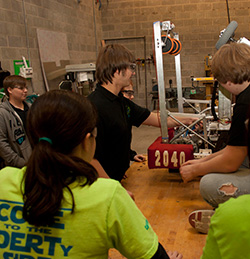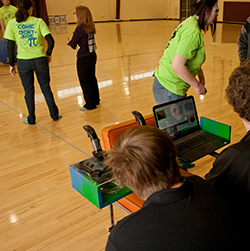Dunlap students prepare to compete in an international high school robotics competition.
A prolific inventor with more than 400 patents to his name, Dean Kamen is best known for the Segway, the two-wheeled, battery-powered electric vehicle he introduced to the world in 2001. But Kamen is no mere technician—he’s also in the advocacy business. Involving future innovators in the STEM fields of science, technology, engineering and mathematics is something he’s gotten down to, well, a science.
In 1989, Kamen spearheaded the creation of FIRST—For Inspiration and Recognition of Science and Technology—a nonprofit organization headquartered in Manchester, New Hampshire. Its programs, which involve the hands-on construction of operational robots, encourage youth to pursue careers in the STEM fields while developing teamwork, self-confidence, communication skills and ethical competitive practices. Since its inception, FIRST has grown to reach more than 350,000 students and 130,000 adult volunteers around the world.
Mind Games
This year, the FIRST Robotics Competition (FRC)—lovingly referred to as “the varsity sport for the mind”—includes 68,000 high school students across 2,720 teams. The international kickoff event in January, featuring a launch video broadcast simultaneously to all competitors, marked the beginning of a six-week build season during which the teams designed and constructed their robots to complete tasks specific to this year’s competition. Once the build season ended in February, teams began competing in regional matches to qualify for district and international championship games. This year’s FIRST Championship takes place April 24th to 26th at the Edward Jones Dome in St. Louis, Missouri.
The FRC’s games change each year, demanding a range of skills of the teams’ robots; past objectives have included throwing discs, climbing trellises and shooting basketballs. The 2014 game, Aerial Assist, requires robots to pass exercise balls over a five-foot-tall beam in the middle of a 24’-by-54’ arena and into goals at either end of the field. Each team and robot is paired with two others, so that six robots in two opposing alliances compete for points, with bonus points awarded for goal assists among the robot teammates.
At the kickoff event, each team received a kit of parts consisting of everything they need to build their robot, from mechanical and electrical equipment—power converters, circuit breakers, design software, motors and batteries—to scholarship information packets and even a fundraising toolkit. Also included were serialized plastic tags and two 120-cubic-foot gusseted poly bags, used to “bag and tag” the teams’ robots immediately following the build period. From that point until the regional matches begin—as well as in between competitions—no improvements can be made to the robots, ensuring a uniform build period for all teams and protecting the robots from the elements while being transported.

Getting DERTy
While keeping their robots clean is a priority, the students are more than willing to engage in all the hands-on labor that comes with the build season. In fact, the Dunlap Eagles Robotics Team (DERT) has adopted a philosophy of spreading the word about FIRST and STEM education through hard work; its shirts sport the motto “Come to the DERTy Side—We Have π,” and its website asserts they have no qualms about “rolling up [their] sleeves and getting DERTy.”
The team’s roots trace back to 2005, when Dunlap High School teachers and volunteers approached students about joining a Peoria-based FIRST team known as Robot Casserole. The students responded so enthusiastically that Dunlap launched its own robotics team the following year with the support of mentors, parents, sponsors and the high school, which serves as team headquarters.
DERT’s head mentor, Jonathan Atkinson, has been involved with FIRST since his freshman year of high school in 2006. “It was amazing,” he says of his involvement as a student. “It was such a profound experience that I wanted to be involved with FIRST moving forward.” After joining the Leonardtown, Maryland RoboBees, inspiring the creation of Chesapeake, Virginia’s Hickory High School Hawk Collective, and mentoring high school robotics teams as a college student, Atkinson has adopted FIRST’s mission in his own career. A Caterpillar engineer by day, he spends a great deal of time off the clock working with DERT in a capacity equivalent to that of an athletics coach.
Indeed, DERT is not unlike a sports team: involvement is voluntary, meetings are held after school and on weekends, and academic eligibility requirements are strictly enforced. But while athletic teams typically base membership on physical attributes and previously-acquired skills, Atkinson notes that robotics is accessible to all students, no matter their capabilities. “This is one of the few teams where we accept everyone and find a place for them.” Those with advanced knowledge of software engineering or carpentry can get involved in the hands-on construction, while those not mechanically or technologically inclined can create posters or make hotel reservations for trips to competitions. “The main vision,” Atkinson explains, “is just to get students involved in technology—in any form.”
Optimal Efficiency
DERT captain Elizabeth Wickham Kolstad, who has been involved with FIRST since the sixth grade, is charged with ensuring the team’s pre-competition work is completed on time and that the robot is fully functional. On February 17th, the last day of the build period, the high school senior kept a watchful eye over the final hours of testing and calibrating before the team’s robot was bagged. Due to ongoing construction at the high school and this winter’s harsh weather, DERT lost about two weeks of build time—a substantial portion of an already-strenuous schedule—but the captain is pleased with her team’s work. “Even with all the snow days,” she reports, “we’re still ahead of schedule.”
And so, with a day of building to spare, DERT’s robot—nicknamed the T-Rex—was launching official Aerial Assist exercise balls six and seven feet in the air toward a practice goal constructed out of two-by-fours. The T-Rex stands about three feet high on a mechanized base and features giant wheels, specially designed to allow movement in all directions; a rectangular arm for picking up objects; a shooting mechanism; and a camera. A deck of computers sits a safe distance from the field of operation, while senior David Smith, using a standard game controller, maneuvers the robot across the arena at surprising speeds. The mounted camera and computer readouts come in handy as Smith and his cohorts guide the T-Rex toward a ball, lower the grab arm to pick it up, cruise across the field, and eject the ball through two high-speed spinning wheels which fling it into the goal.
The T-Rex isn’t the only robot DERT has constructed this season. “This one is nice and pretty with nice welds,” says Wickham Kolstad. “The other one is our prototype bot.” While the polished T-Rex travels to competitions, the prototype stays in the machine shop at Dunlap High School, where it serves as a model for any modifications the team intends to make to the T-Rex. Throughout the season, it is refined and improved so the team can bring the production robot to peak performance for the FIRST Championship.
 Awesome Autonomy
Awesome Autonomy
While many FIRST teams rely on professional mentors for much of their skilled labor, Dunlap’s team prides itself on its student-run operations. In the fall, DERT members can build experience and expertise in the VEX Robotics Competition, a scaled-down version of the FRC. “We use VEX as a tool to teach them the skills they’ll need for FIRST,” Atkinson says, adding that the more experienced students supervise the newcomers, who do most of the hands-on work. After only three weeks of construction, DERT’s two teams took first and second place in a 2013 VEX regional. Just a few months later, their T-Rex hit the ground running in a series of FIRST regional competitions as near as Pekin and as far away as Milwaukee.
Lisa Mathes, a parent chaperone for several years and head mentor for the 2012-13 season, reports that students took it upon themselves to spread the word about DERT around the school and community. Through cooperation with other teams and clubs, short skits in assemblies, vigorous fundraising—including their own Kickstarter campaign—and an open house for the local school board, the team exhibits enthusiasm and dedication not unlike that of FIRST founder Kamen. “When you look at how they started and what they’ve created,” Mathes says, “it’s pretty amazing.”
Of course, it’s not all-work-and-no-play in Dunlap’s machine shop and computer lab. While a majority of DERT’s mentors are professional engineers, they also happen to be parents of students on the team. Thanks to their professional skills and easy approachability, team meetings and build sessions are educational, productive and fun for all involved. Parent volunteer Tracy Sarsfield is grateful for the opportunity to spend time with these talented students. “It amazes me what these kids can do,” she exclaims. “They start with absolutely nothing, and end up with awesomeness!”
Gracious Pre-Professionals
While the regionals and the FRC Championship are highly competitive events, Kamen and FIRST stress the concept of “gracious professionalism” for all teams and volunteers. The term was coined by Woodie Flowers, MIT emeritus professor of mechanical engineering and a collaborator with Kamen in the founding of FIRST. “We do our best work,” Flowers says, “while helping others and treating folks with respect.” This ethos enables FIRST to blend education and empathy with a healthy competitive attitude, so students learn to work cooperatively within their own teams as well as with members of competing teams. Flowers’s advice to “be kind and creative” is offered in the spirit of helping them enjoy the satisfaction of their hard work.
Mathes notes that students with FIRST experience learn valuable life skills—time management, teamwork, problem solving, and even good table manners—in addition to technical education, and she applauds the organization’s friendly spirit. “The idea is: ‘If I lift you up, then I’m lifted up as well.’ We’re not out to just annihilate each other; we’re here to make everybody better.” Case in point: FIRST veterans who leave for college often return home—as Mathes’ own daughter has—to cheer on their teams at competitions.
And the spectators at FIRST events are held to the same standards of sportsmanship as the participants. Family members and friends are expected to cheer for everyone, regardless of team loyalties—just as team members are expected to applaud their opponents, assist in mid-match emergencies, and encourage one another. Atkinson speaks highly of the competing teams’ cooperative spirit and willingness to help one another, likening the international FRC community to a family. “There are a lot of teams online that put up… suggestions for teams who aren’t as engineering-savvy, so they have ideas of other things they can try.”
Catalyst for College and Career
A direct testament of FIRST’s power to draw students into the STEM fields, Wickham Kolstad was recently accepted to Iowa State University, where she plans to pursue mechanical or electrical engineering. Her long history with FIRST has given her a leg up, as employers like Caterpillar Inc.—one of DERT’s corporate sponsors—prize the ethical and technical skills encouraged by the program. But for now, Wickham Kolstad is enjoying DERT’s successes and camaraderie. “I could not have asked for a better team,” she says proudly.
Meanwhile, lead mentor Atkinson focuses his energies on making sure students are engaged in the team’s operations, learning new skills and approaching tasks with open minds, but at the end of the day, his main goal is to help young people grow as individuals. “We are mentoring these students to change their lives for the better,” he says. “That’s why I want to do this… That’s all that matters for me.” And FIRST is what makes it all possible. iBi
Keep up with DERT and its progress in the spring regional competitions at dert2040.net.


